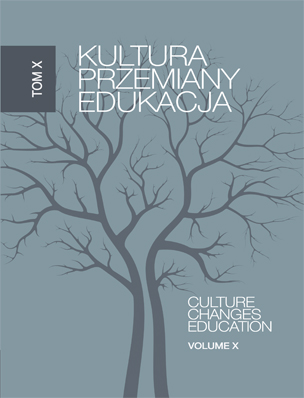Psychologiczne i neurorozwojowe następstwa pandemii COVID-19 u dzieci i młodzieży – przegląd badań i doniesień
DOI:
https://doi.org/10.15584/kpe.2022.10.6Słowa kluczowe:
zdrowie psychiczne, opóźnienie neurorozwojowe, pandemia COVID-19, dziecko, izolacjaAbstrakt
Pandemia COVID-19 wpłynęła na życie ludzi na całym świecie, w tym dzieci i młodzieży. Oprócz różnych obrazów klinicznych zakażenia i jego potencjalnych skutków długoterminowych, istnieje szeroki wachlarz następstw psychologicznych wynikających ze stresu, niepokoju i poczucia bezradności, będących efektem stosowania środków ograniczających rozprzestrzenianie się zakażenia i lockdownu. Dzieci i młodzież, jako grupa szczególna, potrzebują określonych warunków do prawidłowego rozwoju. Zależy on od kontaktów z rówieśnikami, regularnego rozkładu dnia, stawiania sobie nowych wyzwań, a przede wszystkim poczucia bezpieczeństwa, które powinni zapewnić im dorośli. W dobie globalnej pandemii wymagania te są bardzo trudne do spełnienia. W związku z tym, obserwujemy wzrost częstotliwości pojawiania się zaburzeń psychicznych w grupach najmłodszych. W artykule przedstawiono aktualne dane dotyczące liczby i rodzaju zaburzeń opisywanych u dzieci i młodzieży w związku z pandemią COVID-19, proponowane narzędzia diagnostyczne służące ich rozpoznawaniu oraz zalecenia dotyczące postępowania z dzieckiem wymagającym interwencji psychologicznej. Przedstawiono również problematykę zaburzeń neurorozwojowych u dzieci urodzonych w czasie pandemii. W artykule wykorzystano dostępne, wybrane opracowania naukowe oraz danych z raportów krajowych i międzynarodowych.
Downloads
Bibliografia
Chawla N., Tom A., Sen M.S., Sagar R., Psychological Impact of COVID-19 on Children and Adolescents: A Systematic Review, “Indian J Psychol Med” 2021, 43(4). doi: 10.1177/02537176211021789.
Chung H.W., Apio C., Goo T. et al., Effects of government policies on the spread of COVID-19 worldwide, “Sci Rep” 2021, 11(1). Published 2021 Oct 14. doi: 10.1038/s41598-021-99368-9.
Dąbrowska P., Zdrowie psychiczne dzieci i młodzieży w roku 2020 na podstawie rozmów w 116 111 – telefonie zaufania, „Dziecko Krzywdzone. Teoria, Badania, Praktyka” 2021, 20(2).
Das J.M., Saadabadi A., Abulia [In:] StatPearls. Treasure Island (FL): StatPearls Publishing; November 21, 2021.
Deoni C.L.S., Beauchemin J., Volpe A., D’Sa V., The RESONANCE Consortium. Impact of the COVID-19 Pandemic on Early Child Cognitive Development: Initial Findings in a Longitudinal Observational Study of Child Health, “medRxiv” 2021.08.10.21261846. doi: 10.1101/2021.08.10.21261846.
Fegert J.M., Vitiello B., Plener P.L., Clemens V., Challenges and burden of the Coronavirus 2019 (COVID-19) pandemic for child and adolescent mental health: a narrative review to highlight clinical and research needs in the acute phase and the long return to normality, “Child Adolesc Psychiatry Ment Health” 2020, 14. Published 2020 May 12. doi:10.1186/s13034-020-00329-3.
Ghosh R., Dubey M.J., Chatterjee S., Dubey S., Impact of COVID -19 on children: special focus on the psychosocial aspect, “Minerva Pediatr” 2020, 72(3). doi: 10.23736/S0026-4946.20.05887-9.
Hill R.M., Rufino K., Kurian S., Saxena J., Saxena K., Williams L., Suicide Ideation and Attempts in a Pediatric Emergency Department Before and During COVID-19, “Pediatrics” 2021, 147(3). doi:10.1542/peds.2020-029280.
Holmes E.A., O’Connor R.C., Perry V.H. et al., Multidisciplinary research priorities for the COVID-19 pandemic: a call for action for mental health science, “Lancet Psychiatry” 2020, 7(6). doi:10.1016/S2215-0366(20)30168-1.
Kazak, A.E., Pediatric Psychosocial Preventative Health Model (PPPHM): Research, practice, and collaboration in pediatric family systems medicine, “Families, Systems, & Health” 2006, 24(4). DOI: 10.1037/1091-7527.24.4.381.
Parent N., Dadgar K., Xiao B., Hesse C., Shapka J.D., Social Disconnection During COVID-19: The Role of Attachment, Fear of Missing Out, and Smartphone Use, “J Res Adolesc” 2021, 31(3). doi: 10.1111/jora.12658.
Pedrosa A.L., Bitencourt L., Fróes A.C.F. et al., Emotional, Behavioral, and Psychological Impact of the COVID-19 Pandemic, “Front Psychol” 2020, 11. Published 2020 Oct 2. doi: 10.3389/fpsyg.2020.566212.
Provenzi L., Grumi S., Altieri L. et al., Prenatal maternal stress during the COVID-19 pandemic and infant regulatory capacity at 3 months: A longitudinal study, “Development and Psychopathology” 2021:1-9. doi:10.1017/S0954579421000766
Rider EA, Ansari E, Varrin PH, Sparrow J., Mental health and wellbeing of children and adolescents during the covid-19 pandemic, “BMJ” 2021;374:n1730. Published 2021 Aug 24. doi:10.1136/bmj.n1730.
Shah K., Mann S., Singh R., Bangar R., Kulkarni R., Impact of COVID-19 on the Mental Health of Children and Adolescents, “Cureus” 2020;12(8). Published 2020 Aug 26. doi: 10.7759/cureus.10051.
Shuffrey L.C., Firestein M.R., Kyle M.H. et al., Association of Birth During the COVID-19 Pandemic With Neurodevelopmental Status at 6 Months in Infants With and Without In Utero Exposure to Maternal SARS-CoV-2 Infection, “JAMA Pediatr”, Published online January 04, 2022. doi: 10.1001/jamapediatrics.2021.5563.
Singh S., Roy D., Sinha K., Parveen S., Sharma G., Joshi G., Impact of COVID-19 and lockdown on the mental health of children and adolescents: A narrative review with recommendations, “Psychiatry Res” 2020, 293. doi: 10.1016/j.psychres.2020.113429.
Tronick E., Als H., Adamson L., Wise S., Brazelton T.B., The infant’s response to entrapment between contradictory messages in face-to-face interaction, “J Am Acad Child Psychiatry” 1978 Winter, 17(1). doi: 10.1016/s0002-7138(09)62273-1. PMID: 632477.
Wenner Moyer M., The COVID generation: how is the pandemic affecting kids’ brains?. “Nature” 2022, 601(7892). doi: 10.1038/d41586-022-00027-4.
Yard E., Radhakrishnan L., Ballesteros M.F. et al., Emergency Department Visits for Suspected Suicide Attempts Among Persons Aged 12–25 Years Before and During the COVID-19 Pandemic – United States, January 2019 – May 2021, “MMWR Morb Mortal Wkly Rep” 2021, 70. DOI: 10.15585/mmwr.mm7024e1external icon.
https://programyrekomendowane.pl/strony/zdrowie-psychiczne-mlodziezy-w-czasie-pandemii-covid-19,422
https://www.apa.org/monitor/2022/01/special-childrens-mental-health
https://www.luriechildrens.org/en/blog/childrens-mental-health-pandemic-statistics/
https://eric.ed.gov/?id=ED606305mhcyp_2020_rep.pdf (digital.nhs.uk)
https://missionhealth.org/wp-content/uploads/2018/04/Adolescent-Depression-Screening-PHQ-A-Form.pdf
https://www.nimh.nih.gov/research/research-conducted-at-nimh/asq-toolkit-materials
https://www.gov.pl/web/koronawirus/gdzie-znajdziesz-pomoc-w-przypadku-pogorszenia-stanu-psychicznego
https://www.nik.gov.pl/aktualnosci/lecznictwo-psychiatryczne-dzieci-i-mlodziezy.html
https://www.anagomez.org/wp-content/uploads/dlm_uploads/2020/06/OysterandButterfly-Polish.pdf
https://www.unicef.org/rosa/stories/supporting-your-children-return-school-during-covid-19
https://www2.ed.gov/documents/coronavirus/reopening-2.pdf
https://www.apa.org/monitor/2022/01/special-childrens-mental-health
Pobrania
Opublikowane
Jak cytować
Numer
Dział
Licencja
Prawa autorskie (c) 2022 KULTURA – PRZEMIANY – EDUKACJA

Utwór dostępny jest na licencji Creative Commons Uznanie autorstwa – Bez utworów zależnych 4.0 Międzynarodowe.


